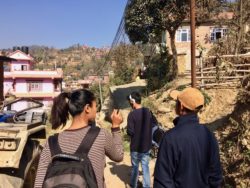Related Projects
Changing the Story is just one of a number of projects globally that seeks to make a significant impact by addressing global development challenges through arts and humanities research. The growing list below shares some of these projects. If you have a project you would like to share with us, please contact us.
Everyday sites of violence and conflict
PhD student, Frazer McDonald Hay, explores memory and narratives of violence in his most recent report 'Everyday sites of violence and conflict: Exploring memories in Mosul and Tel Afar.' Frazer's research considers the notion that there is an important social and political layer of everyday life, which is relatively unnoticed by the peacebuilding establishment engaged in social cohesion processes. Find out more.
Teaching and Learning War Research Network
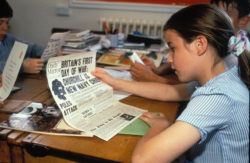 Funded by the Arts and Humanities Research Council Research Networking Scheme, the Teaching and Learning War research network, led by Professor Catriona Pennell (University of Exeter), brings together researchers and stakeholders to explore young people’s engagement with and receptivity to the cultural memory messages of the two world wars from an international comparative perspective focusing on Britain and the Commonwealth. While study of memory and war remembrance has intensified in recent years, the way young people engage with the cultural messages about these seminal historical events is largely unexplored. Interrogating the practices of teaching and learning about war remembrance has the potential to illuminate how memories of war are shaped. The network explores four main questions: How do young people think about the past? How have indigenous and/or ethnic minority histories been integrated into the representation and teaching of the two world wars? What role does empathy play in the teaching of the two world wars? And how does youth-centred centenary commemorative activity compare across the British world? The network capitalises on and consolidates informal links between other projects including ‘The First World War in the Classroom: Teaching and the Construction of Cultural Memory’. Find out more.
Funded by the Arts and Humanities Research Council Research Networking Scheme, the Teaching and Learning War research network, led by Professor Catriona Pennell (University of Exeter), brings together researchers and stakeholders to explore young people’s engagement with and receptivity to the cultural memory messages of the two world wars from an international comparative perspective focusing on Britain and the Commonwealth. While study of memory and war remembrance has intensified in recent years, the way young people engage with the cultural messages about these seminal historical events is largely unexplored. Interrogating the practices of teaching and learning about war remembrance has the potential to illuminate how memories of war are shaped. The network explores four main questions: How do young people think about the past? How have indigenous and/or ethnic minority histories been integrated into the representation and teaching of the two world wars? What role does empathy play in the teaching of the two world wars? And how does youth-centred centenary commemorative activity compare across the British world? The network capitalises on and consolidates informal links between other projects including ‘The First World War in the Classroom: Teaching and the Construction of Cultural Memory’. Find out more.
The Big Picture
The Big Picture: Adapting Photovoice to enhance psychological, social & cultural insights into & prevention & treatment of youth substance use in India is a project that focuses on understanding the lived experience of young Indian people around risk, recovery and resilience in relation to substance use disorder (SUD). The goal is to increase knowledge, enhance the voice of young people, and inform practice through impacting policy and promoting public awareness. Our visual participatory method - Photovoice (PV) - centralises the lived experience of young people in efforts to understand, prevent and intervene - at both a service and policy level - in substance-use-related mental health difficulties in India. The research will be conducted in Assam and we will explore transferability to other Indian States. The Big Picture is a UK ESRC-funded project led by University of Leeds.
Dealing With The Past
 After the armed conflicts in the former Yugoslavia, a large number of individuals and civil society organizations in the region of the Western Balkans dedicated their work to the process of Dealing with the Past (DwP), conflict prevention and peace building. A high number of organizations, initiatives, and individuals are engaged in Dealing with the Past process and there are numerous activities and publications in this field. In order to preserve this important working heritage of organizations, initiatives and individuals from Western Balkans, Forum Civil Peace Service (forumZFD) decided to develop a resource platform on topics related to Dealing with the Past and offer this platform to all interested stakeholders for use. This regional website with the focus on topics related to Dealing with the Past in the Western Balkans is the first resource platform with this purpose and it serves as a regional database for all organizations, individuals and initiatives in the region acting in this field. It will also collect publications, documents, and articles on this topic. Beneficiaries of this resource platform are NGOs, members of governmental institutions involved in the process of DwP as well as academia, civil society, artistic society, journalists, youth and all other stakeholders that are interested in this topic. The website is available in English, Albanian, Macedonian and BCSM (Bosnian, Croatian, Serbian, and Montenegrin).Visit the website.
After the armed conflicts in the former Yugoslavia, a large number of individuals and civil society organizations in the region of the Western Balkans dedicated their work to the process of Dealing with the Past (DwP), conflict prevention and peace building. A high number of organizations, initiatives, and individuals are engaged in Dealing with the Past process and there are numerous activities and publications in this field. In order to preserve this important working heritage of organizations, initiatives and individuals from Western Balkans, Forum Civil Peace Service (forumZFD) decided to develop a resource platform on topics related to Dealing with the Past and offer this platform to all interested stakeholders for use. This regional website with the focus on topics related to Dealing with the Past in the Western Balkans is the first resource platform with this purpose and it serves as a regional database for all organizations, individuals and initiatives in the region acting in this field. It will also collect publications, documents, and articles on this topic. Beneficiaries of this resource platform are NGOs, members of governmental institutions involved in the process of DwP as well as academia, civil society, artistic society, journalists, youth and all other stakeholders that are interested in this topic. The website is available in English, Albanian, Macedonian and BCSM (Bosnian, Croatian, Serbian, and Montenegrin).Visit the website.
Art, Language, Youth and the legacy of Conflict in Lebanon
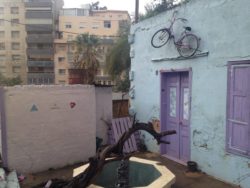
The blue house project in Beirut painted in 2013 by two local, socially-engaged arts collectives, Paint Up! and Dispatch Beirut
Art, Language, Youth and the legacy of Conflict in Lebanon is a sister project of Changing the Story, based at the Centre for World Cinemas and Digital Cultures at University of Leeds. It is the second phase of an AHRC Open World Research Initiative project led by Professor Paul Cooke entitled "Remapping World Cinemas for the Digital Age Finding Ways for the Digital Subaltern to Speak". Using a range of participatory arts methodologies - in particular the co-production of video responses to the project’s findings - we will explore the role of language in Lebanon, in particular the place of linguistic hybridity amongst young people, in generating new societal narratives that are engaging with the nation’s difficult past, with the aim of supporting increased social cohesion and stronger civil society. Find out more.
Community Arts for Resistant Antibiotics in Nepal (CARAN)
Evidence has shown that antibiotic resistance (ABR) is a growing threat to public health in Nepal. This AHRC/MRC project led by Prof. Paul Cooke with colleagues from University of Leeds' Nuffield Centre (Dr Rebecca King and Prof James Newell) and Nepal's HERD International proposes to develop and pilot test an innovative intervention using community led solutions to address the problem of antibiotic misuse at the level of individuals, households, communities, and district and national policy makers. This will directly support the delivery of the UN’s Sustainable Development Goals, in particular SDG 3: ‘ensuring healthy lives and promoting well-being for all at all.The project envisions a unique blend of humanities, social sciences and public health approaches, and uses participatory filmmaking methodology as its central approach. Find out more.
Resilience among young people in a community affected by drought
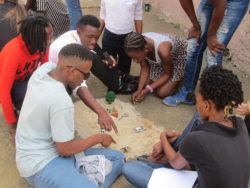
The expertise of young co-researchers in South Africa, supported by young co-researchers in the UK is being harnessed for this co-productive research project. Together we are exploring how South African young people and their elders cope with the physical and mental impacts of drought. The project is led by Professor Angie Hart from the University of Brighton. Funded by the Government’s Global Challenges Research Fund (GCRF), our UK-based Univesity of Brighton and Boingboing social enterprise team is working with overseas partners. Together we are trying to improve understanding about what enables young people to withstand, adapt to, resist or challenge the impact of drought. Further details about the project can be found here.
Research Cluster on Peace, Memory and Cultural Heritage
![]()
The Research Cluster on Peace, Memory and Cultural Heritage is a group of critical peace and conflict researchers united by an interest in the nexus of peacebuilding, the politics of memory and cultural heritage. They are currently running two projects: "Peace and the Politics of Memory" and "The Cultural Heritage of Conflict". They are led by The Swedish Institute of International Affairs. Visit the website.
The Nahrein Network
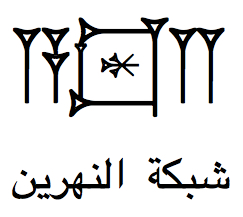 "The Nahrein Network: new ancient history research for education in Iraq and its neighbours" is a fellow AHRC GCRF Network Plus project. It is lead by Professor Eleanor Robson at University College London, with Co-Investigators at University of Oxford and University of Kurdistan Hewler, and a range of partners including Al-Amal Association (Iraq), the University of Baghdad, Basrah Museum, The British Institute for the Study of Iraq, the Research Centre for the Sustainable Development of Cultural Heritage (Kurdistan), and UNESCO Iraq. Visit the website.
"The Nahrein Network: new ancient history research for education in Iraq and its neighbours" is a fellow AHRC GCRF Network Plus project. It is lead by Professor Eleanor Robson at University College London, with Co-Investigators at University of Oxford and University of Kurdistan Hewler, and a range of partners including Al-Amal Association (Iraq), the University of Baghdad, Basrah Museum, The British Institute for the Study of Iraq, the Research Centre for the Sustainable Development of Cultural Heritage (Kurdistan), and UNESCO Iraq. Visit the website.
Sumak Kawsay and the Sustainable Development Agenda
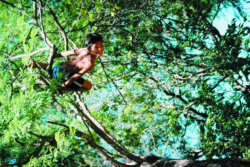
A picture of a Pankararu boy in Pernambuco, Brazil, from the project Índios na visão dos índios, organised by the NGO Thydêwá. You can find out more about the Índios na visão dos índios project here.
“Sumak Kawsay and the Sustainable Development Agenda: Critical Debates and Creative Responses from a Latin American Indigenous Perspective” is an AHRC Research Network project led by Dr. Thea Pitman at University of Leeds, UK that explores how the Sustainable Development Goals might better take account of the perspectives of indigenous communities who have previously criticised these goals for being ‘culturally blind’, working closely with partners in Brazil and Colombia. More info.
Deepening democracy in extremely politically fragile countries
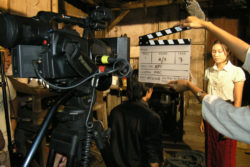
Yangon Film School alumnus Lay Thida filming during the 2008 Beginners' Course
"Deepening democracy in extremely politically fragile countries: networking for historical, cultural and arts research on Parliaments and people" is a fellow AHRC GCRF Project led by Professor Emma Crewe from the School of Oriental and African Studies. Professor Crewe: “The Global Research Network on Parliaments and People will be creating opportunities for national scholars in extremely politically fragile states, especially Ethiopia and Myanmar, to develop their capacity to undertake interdisciplinary research on politics. This will enhance scrutiny, understanding, and support for the processes and relationships required to deepen democracy.” The project works with a range of partners to enable research capacity development, including the Forum for Social Studies (Addis) and Enlightened Myanmar Research Foundation (Yangon) . More info.

